Key takeaways:
- Recognizing the subtle dynamics of control and manipulation is essential in identifying abusive relationships.
- Seeking help from friends, professionals, and support groups can significantly aid recovery and provide a sense of community.
- Accessing resources such as hotlines and online forums empowers individuals to navigate their challenges after an abusive relationship.
- Advocating for gender equality and sharing personal stories can inspire collective strength and support for others facing similar struggles.
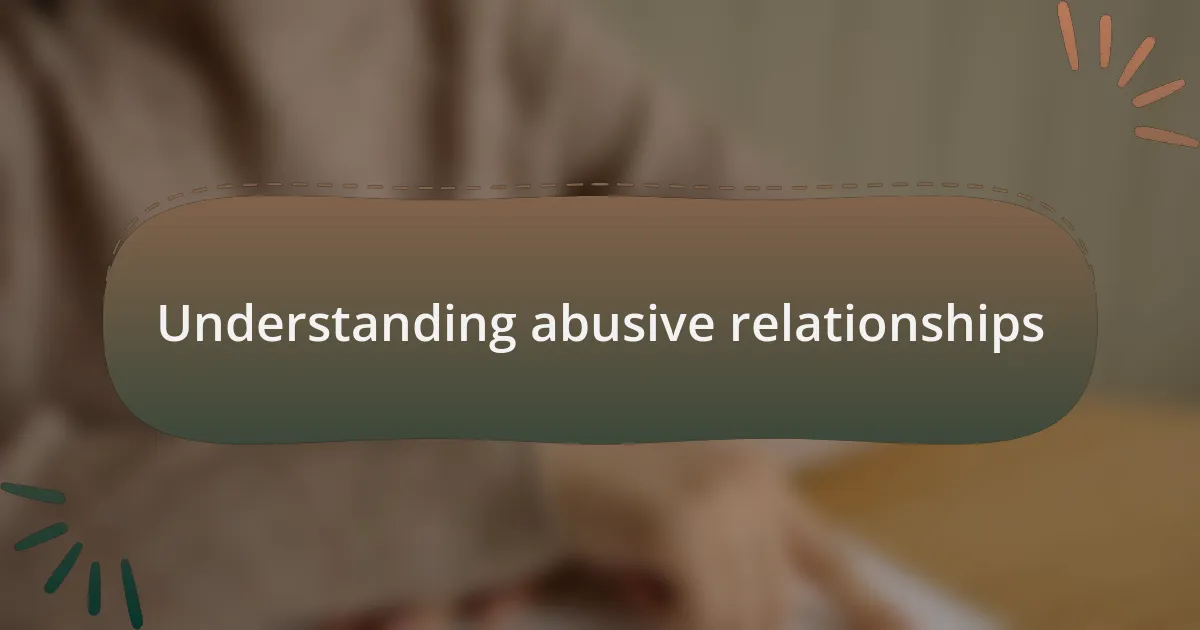
Understanding abusive relationships
Understanding abusive relationships can often be a complex and confusing experience. For instance, during my own journey, I remember struggling to differentiate between love and control. Have you ever stopped to think about how subtle manipulations can wear down your sense of self?
Abuse isn’t just physical; it manifests through emotional, psychological, and even financial means. I once found myself doubting my worth after constant criticism masked as “concern.” It’s unsettling how easily someone can chip away at your self-esteem, leaving you questioning reality. Have you ever felt that your feelings were invalidated?
Recognizing these patterns is the first step in understanding the dynamics of abuse. I vividly recall the moment I realized the relationship wasn’t about love; it was about power. That realization was both liberating and terrifying—like waking up from a dream and seeing the world for what it truly was. It made me wonder: how many people remain unaware of the insidious nature of the relationships they’re in?
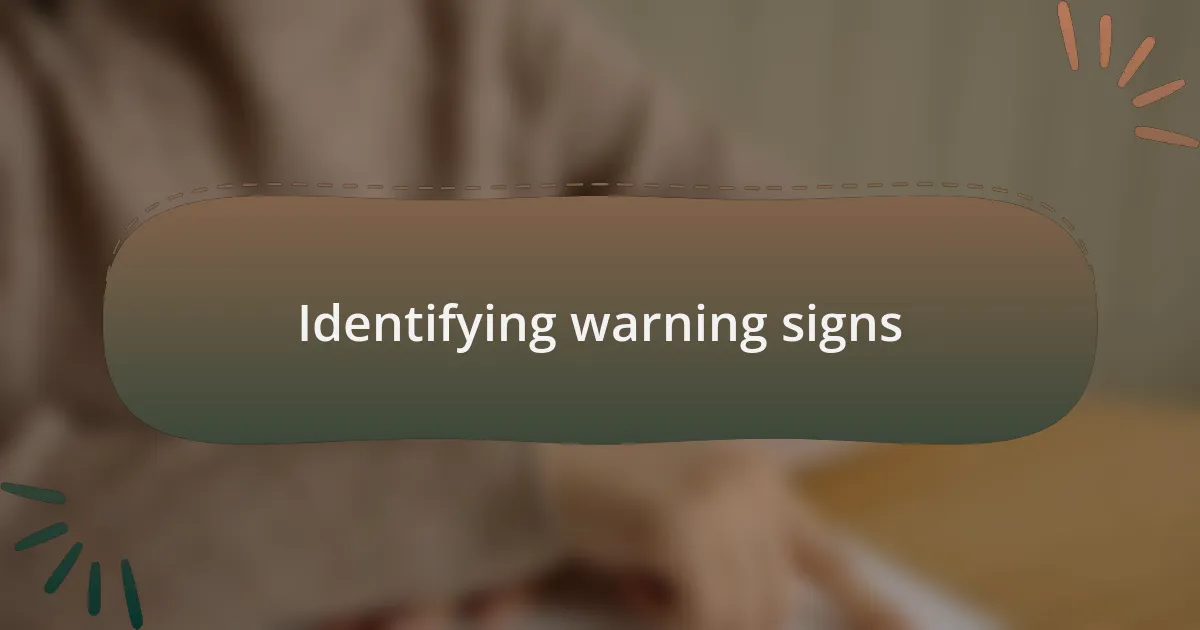
Identifying warning signs
Identifying warning signs in an abusive relationship is crucial, and I wish I had paid attention to them earlier. There were moments when my partner would belittle me in front of friends, claiming it was just “joking around.” Looking back, I realize now that humor shouldn’t come at my expense. Have you ever felt embarrassed or ridiculed in what was supposed to be a safe space?
Isolation was another red flag I ignored. I remember friends reaching out, but my partner would discourage me from spending time with them, insisting I should focus on “us.” It seemed innocent at first, but it soon became evident that cutting ties with loved ones was a tactic to gain control. How often do we let someone dictate our relationships, thinking it’s just their way of showing love?
I also noticed possessiveness disguised as concern. Simple things like wanting to know where I was and who I was with felt comforting at first, but it morphed into excessive monitoring of my whereabouts. This behavior should have raised alarms, but love can cloud reasoning. Reflecting on this, I question: when does care cross the line into control?
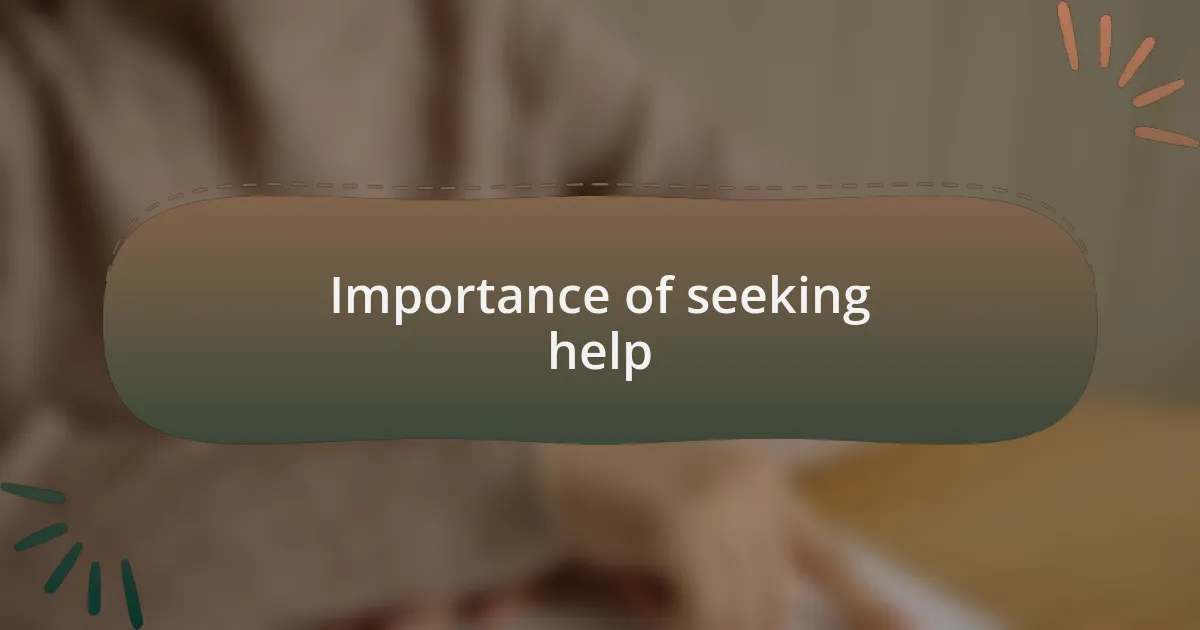
Importance of seeking help
Seeking help in an abusive relationship can be a daunting step, but it’s a vital one toward reclaiming your life. I remember feeling like I couldn’t tell anyone what was happening. It felt shameful, like I was somehow failing. But reaching out to a trusted friend opened a door I didn’t know existed. They not only believed me but also reminded me that I deserved better. Have you ever found that just sharing your burden lightens the load?
Professional support can be a game changer. I sought guidance from a counselor who specialized in abuse. At first, I felt hesitant, unsure if I could share my experiences. However, as I opened up, I realized that these safe spaces were exactly what I needed to navigate my feelings. Have you ever felt that relief of just being heard? Those moments helped me see that I wasn’t alone in my struggles.
Support groups are another incredible resource. I found solace in connecting with others who had similar experiences. Hearing their stories made my own feel less isolating, and we could share strategies for healing together. It made me realize that the journey to recovery is often strengthened through community. Have you considered the power of shared experiences? There’s strength in numbers, after all; together, we can build each other up and find hope in the darkness.
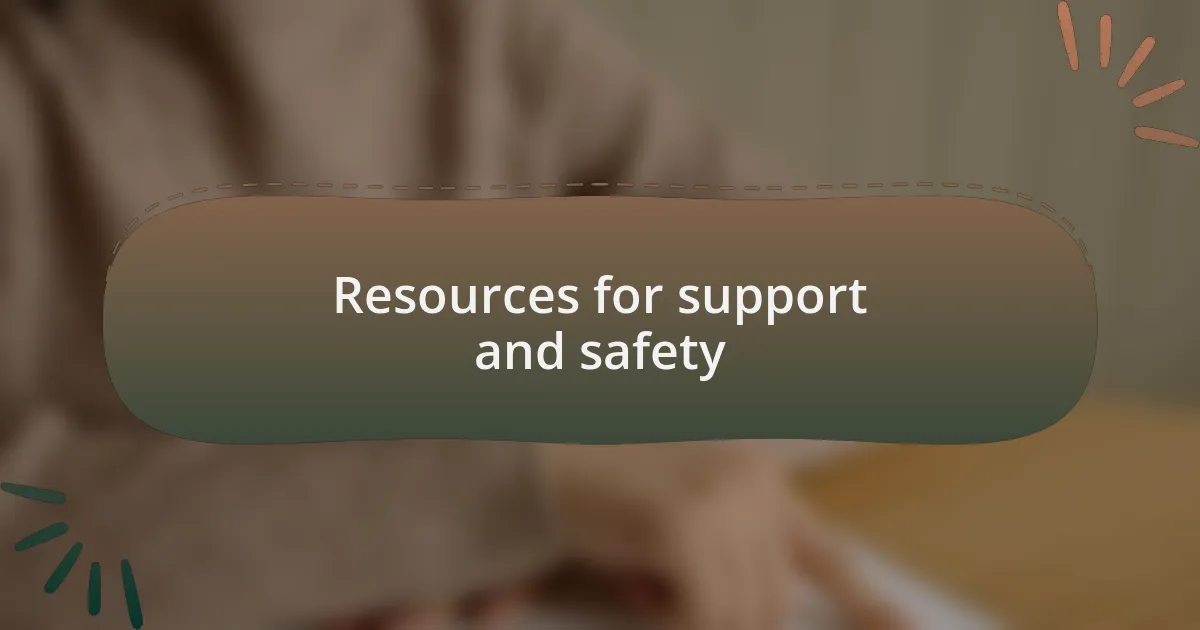
Resources for support and safety
Finding resources for support and safety is crucial in navigating life after an abusive relationship. I recall my own search for a local shelter; it was daunting, but those resources were lifelines. The moment I reached out and learned about available services, I felt a flicker of hope. Have you ever experienced that sense of empowerment when you discover you don’t have to face your struggles alone?
Hotlines are another invaluable source of immediate support. I remember calling a hotline in a moment of crisis; their understanding and encouragement made such a difference. It’s amazing how just a voice on the other end can validate your feelings and steer you toward the next steps. Have you thought about how simply opening up can lead you to the support you need?
Online resources have grown significantly and can provide anonymity and initial guidance. I found many forums and websites dedicated to those escaping abusive situations; they were full of resources, tips, and testimonials. Engaging with these platforms allowed me to learn from others’ journeys and discover options I hadn’t considered. How empowering would it feel to connect with a community that truly understands you?
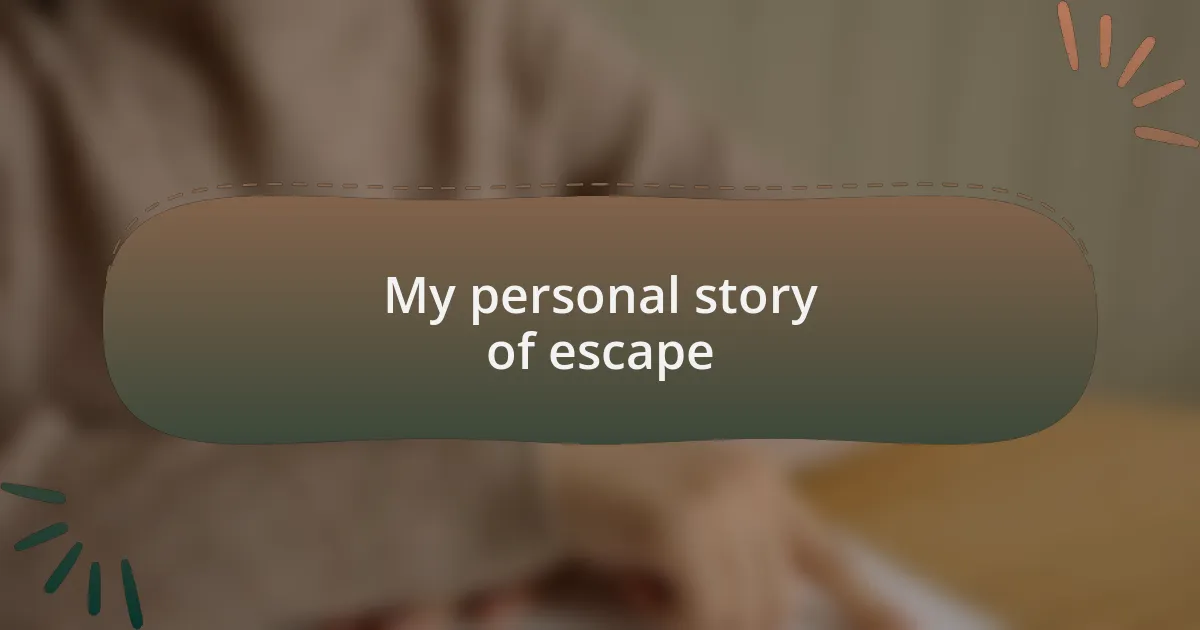
My personal story of escape
I remember the day I finally decided to leave; it was a mix of fear and fierce determination. I could feel my heart racing as I packed a small bag with essentials, knowing that this was a pivotal moment in my life. Have you ever felt that rush of adrenaline when you’re taking a leap into the unknown?
Navigating the immediate aftermath was challenging. I found myself at a friend’s house, plagued by the haunting memories of my past relationship. It was comforting to talk openly about my experiences, yet sometimes, I would still doubt whether I made the right choice. Do you ever wonder if the sacrifices you make for your freedom are worth the struggle?
The real turning point came when I began to embrace my own strength.
I remember standing in front of the mirror one morning, looking into my own eyes, and declaring my worth. It was in that moment that I truly began to reclaim my identity. Have you ever stood up for yourself and felt an overwhelming sense of empowerment?
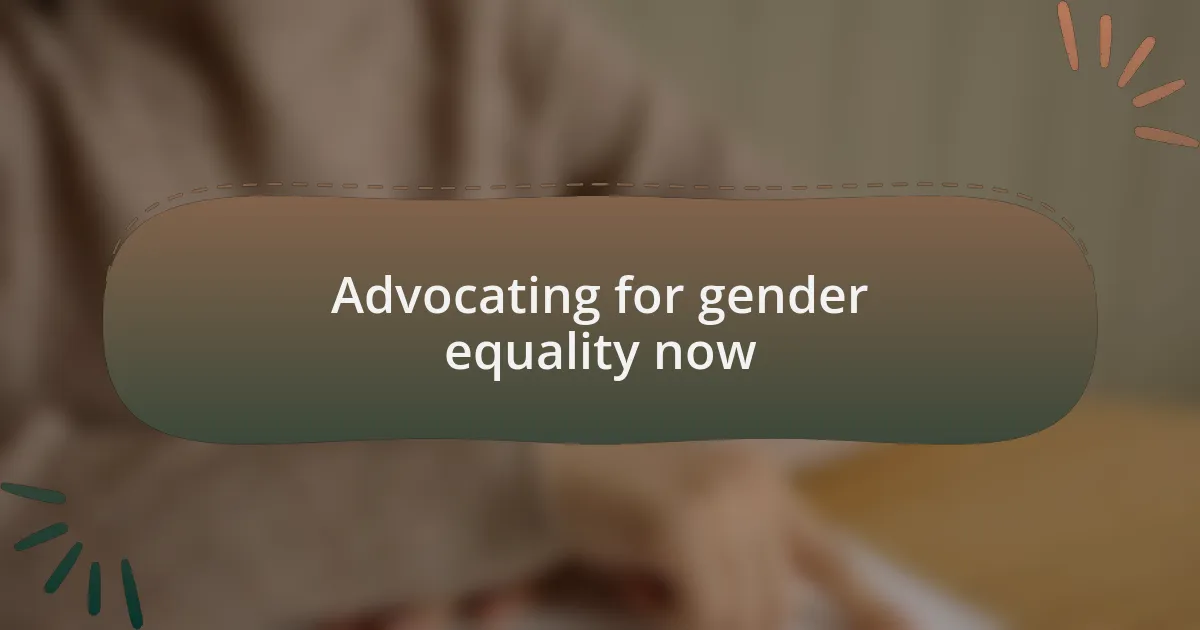
Advocating for gender equality now
Advocating for gender equality now means recognizing that every voice matters. When I first spoke up about the abuse I faced, I felt small and powerless, yet I discovered that sharing my story sparked conversations about the experiences many other women endure in silence. How much more powerful could we be if we all voiced our truths?
In a world where gender discrimination still thrives, I often ask myself: what does true equality look like? For me, it’s the freedom to make choices without fear or judgement. I remember attending a community meeting where women gathered to share their struggles and triumphs; the collective strength in that room was palpable, reinforcing my belief in standing together for change.
Every action counts, no matter how small. I now volunteer at local shelters to support those rebuilding their lives after leaving toxic relationships. Each time I offer my time, I’m reminded that my journey isn’t just about my escape—it’s about lighting the way for others seeking their own freedom. Isn’t it incredible how one person’s experience can ripple out to inspire many?